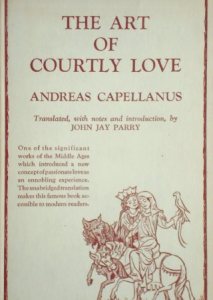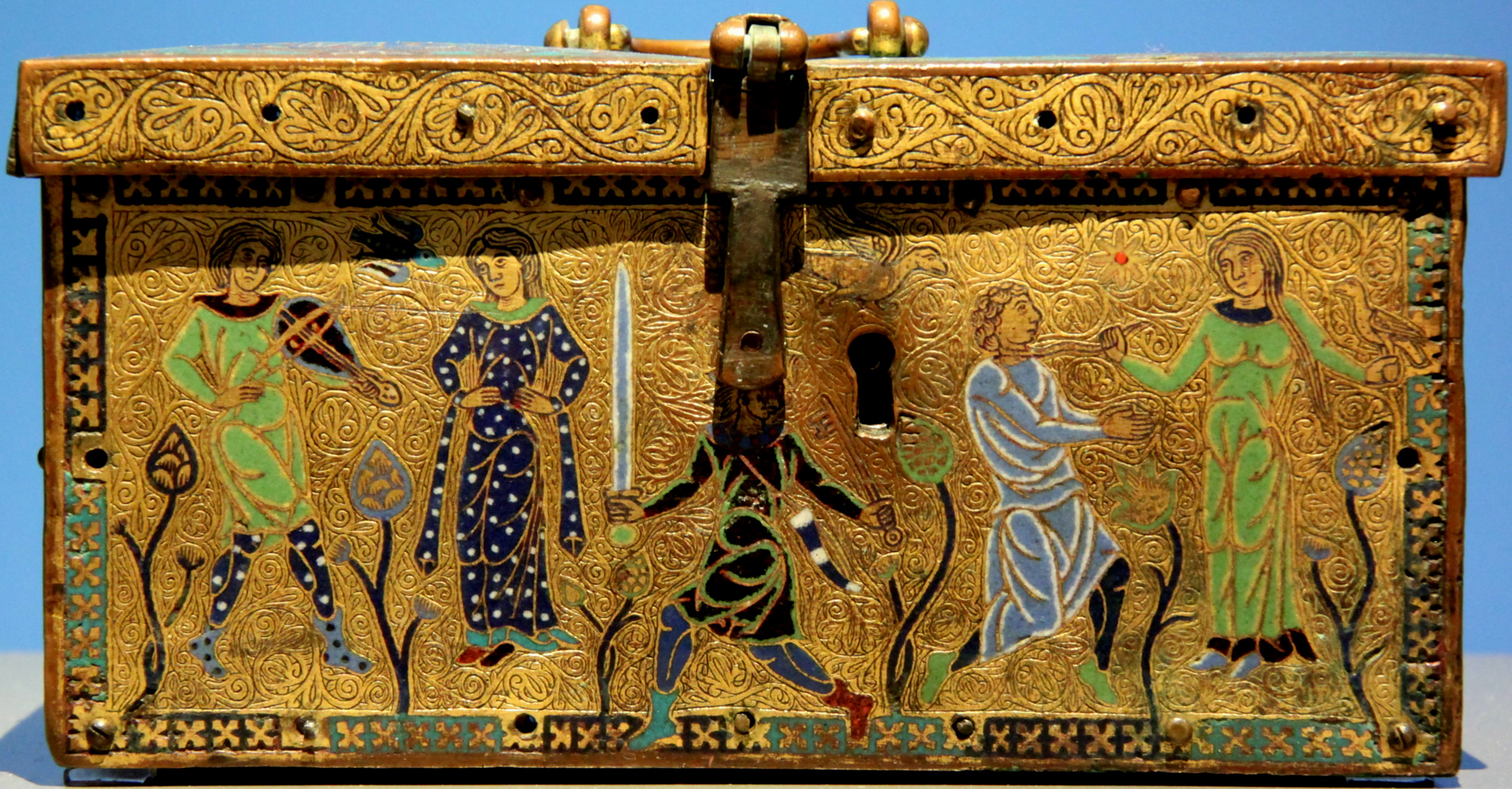Middle Ages Europe is widely considered the birthplace of ‘protofeminism’ – the forerunner to modern feminism. At that time a chaplain named Andreas Capellanus, whom we might consider the first antifeminist and ‘MGTOW’ of the period, wrote a book describing the escalating problem of female avarice, manipulativeness, narcissism, underserved sense of entitlement, and hypergamy. Interestingly, Andreas links all these problems with the birth of courtly love – the subject of his book – and recommends all men learn to reject romantic relationships with women and “trample under your foot all of its rules.”
While the piece is written in anger at the emerging gynocentric culture, it contains truths that echo much of what MGTOW are reacting to today – in particular the world’s encouragement, protection and enforcement of female hypergamy. The following is an excerpt from Capellanus’ amazing work. PW
THE ART OF COURTLY LOVE
By Andreas Capellanus (1174)
 The mutual love which you seek in women you cannot find, for no woman ever loved a man or could bind herself to a lover in the mutual bonds of love. For a woman’s desire is to get rich through love, but not to give her lover the solaces that please him. Nobody ought to wonder at this, because it is natural. According to the nature of their sex all women are spotted with the vice of a grasping and avaricious disposition, and they are always alert and devoted to the search for money or profit. I have travelled through a great many parts of the world, and although I made careful inquiries I could never find a man who would say that he had discovered a woman who, if a thing was not offered to her, would not demand it insistently and would not hold off from falling in love unless she got rich gifts in one way or another. But even though you have given a woman innumerable presents, if she discovers that you are less attentive about giving her things than you used to be, or if she learns that you have lost your money, she will treat like a perfect stranger who has come from some other country, and everything you do will bore her or annoy her. You cannot find a woman who will love you so much or be so constant to you that if somebody else comes to her and offers her presents she will be faithful to her love.
The mutual love which you seek in women you cannot find, for no woman ever loved a man or could bind herself to a lover in the mutual bonds of love. For a woman’s desire is to get rich through love, but not to give her lover the solaces that please him. Nobody ought to wonder at this, because it is natural. According to the nature of their sex all women are spotted with the vice of a grasping and avaricious disposition, and they are always alert and devoted to the search for money or profit. I have travelled through a great many parts of the world, and although I made careful inquiries I could never find a man who would say that he had discovered a woman who, if a thing was not offered to her, would not demand it insistently and would not hold off from falling in love unless she got rich gifts in one way or another. But even though you have given a woman innumerable presents, if she discovers that you are less attentive about giving her things than you used to be, or if she learns that you have lost your money, she will treat like a perfect stranger who has come from some other country, and everything you do will bore her or annoy her. You cannot find a woman who will love you so much or be so constant to you that if somebody else comes to her and offers her presents she will be faithful to her love.
Women have so much avarice that generous gifts break down all the barriers of their virtue. If you come with open hands, no women will let you go away without that which you seek; while if you don’t promise to give them a great deal, you needn’t come to them and ask for anything. Even if you are distinguished by royal honors, but bring no gifts with you, you will get absolutely nothing from them; you will be turned away from their doors in shame. Because of their avarice all women are thieves, and we say they carry purses. You cannot find a woman of such lofty station or blessed with such honor or wealth that an offer of money will not break down her virtue, and there is no man, no matter how disgraced and low-born he is, who cannot seduce her if he has great wealth. This is so because no woman ever has enough money – just as no drunkard ever thinks he has had enough to drink. Even if the whole earth and sea were turned to gold, they could hardly satisfy that avarice of a woman.
Furthermore, not only is every woman by nature a miser, but she is also envious and a slanderer of other women, greedy, a slave to her belly, inconstant, fickle in her speech, disobedient and impatient of restraint, spotted with the sin of pride and desirous of vainglory, a liar, a drunkard, a babbler, no keeper of secrets, too much given to wantonness, prone to every evil, and never loving any man in her heart.
Now woman is a miser, because there isn’t a wickedness in the world that men can think of that she will not boldly indulge in for the sake of money, and, even if she has an abundance she will not help anyone who is in need. You can more easily scratch a diamond with your fingernail than you can by any human ingenuity get a woman to consent to giving you any of her savings. Just as Epicurus believed that the highest good lay in serving the belly, so a woman thinks that the only things worth while in this world are riches and holding on to what she has. You can’t find any woman so simple and foolish that she is unable to look out for her own property with a greedy tenacity, and with great mental subtlety get hold of the possessions of someone else. Indeed, even a simple woman is more careful about selling a single hen than the wisest lawyer is in deeding away a great castle. Furthermore, no woman is ever so violently in love with a man that she will not devote all her efforts to using up his property. You will find that this rule never fails and admits of no exceptions.
That every woman is envious is also found to be a general rule, because a woman is always consumed with jealousy over another woman’s beauty, and she loses all her pleasure in what she has. Even if she knows that it is the beauty of her own daughter that is being praised, she can hardly avoid being tortured by hidden envy. Even the neediness and the great poverty of the neighbour women seem to her abundant in wealth and riches, so that we think of the old proverb which says, “the crop in the neighbour’s field is always more fertile, and your neighbour’s cow has a larger udder,” seems to refer to the female sex without question. It can hardly come to pass that one woman will praise the good character or the beauty of another, and if she should happen to do so, the next minute she adds some qualification that undoes all she has said in her praise.
And so it follows that woman is a slanderer, because slander can only spring from envy and hate. That is a rule that women do not want to break; she prefers to keep it unbroken. It is not easy to find a woman whose tongue can ever spare anybody or who can keep from words of detraction. Every woman thinks that by running down others she adds to her own praise and increases her own reputation – a fact which shows very clearly to everybody that women have very little sense. For all men agree to hold it as a general rule that words of dispraise only hurt the person who utters them, and they detract from the esteem in which he is held; but no woman on this account keeps from speaking evil and attacking the reputation of good people, and so I think we can insist that no woman is really wise. Qualities that a wise man has are wholly foreign to a woman, because she believes, without thinking, everything she hears, and she is very free about insisting on being praised, and she does a great many other unwise things which it would be tedious for me to enumerate.
…
The feminine sex is also commonly tainted by arrogance, for a woman, when incited by that, cannot keep her keep her tongue or her hands from crimes or abuse, but in her anger she commits all sorts of outrages. Moreover, if anybody tries to restrain an angry woman, he will tire himself out with a vain labor, for you cannot keep her from her evil designs or soften her arrogance of soul. Any woman is incited to wrath by a mild enough remark of little significance and indeed at times by nothing at all; and her arrogance grows to tremendous proportions; and as far as I can recall no one ever saw a woman who could restrain it.
Furthermore every woman seems to despise all other women – a thing which we know comes from pride. No person could despise another unless he looked down upon him because of pride. Besides, every woman, not only a young one but even the old and decrepit, strives with all her might to exalt her own beauty; this can come only from pride, as the wise man said very clearly when he said, “There is arrogance in everybody and pride follows beauty.” Therefore it is perfectly clear that women can never have perfectly good characters, because, as they say, “A remarkable character is soiled by an admixture of pride.”
Every woman is also loud-mouthed, since no one of them can keep her tongue from abuses, and even if she loses a single egg she will keep up a clamor all day like a barking dog, and she will disturb the whole neighbourhood over a trifle. When she is with other women, no one of them will give the others a chance to speak, but each always tries to be the one to say whatever is to be said and to keep on talking longer than the rest; and neither her tongue nor her spirit ever gets tired of talking. A woman will boldly contradict everything you say, and she can never agree with anything, but she always tries to give her opinion on every subject.
No woman is attached to her lover or bound to her husband with such pure devotion that she will not accept another lover, especially if a rich one comes along, which shows the wantonness as well as the great avarice of a woman. There isn’t a woman in this world so constant and so bound by pledges that, if a lover of pleasures comes along and with skill and persistence invites her to the joys of love, she will reject his entreaties – at any rate if he does a good deal of urging. No woman is an exception to this rule either. So you can see what we ought to think of a woman who is in fortunate circumstances and is blessed with an honourable lover or the finest of husbands, and yet lusts after some other man. But that is precisely what women do who are too much troubled with wantonness.
Indeed, a woman does not love a man with her whole heart, because there is not one of them who keeps faith with her husband or her lover; when another man comes along, you will find that her faithfulness wavers. For a woman cannot refuse gold or silver or any other gifts that are offered her, nor can she on that account deny the solaces of her body when they are asked for. But since the woman knows that nothing so distresses her lover as to have her grant these to some other man, you can see how much affection she has for a man when, out of greed for gold or silver, she will give herself to a stranger or a foreigner and has no shame about upsetting her lover so completely and shattering the jewel of her own good faith. Moreover, no woman has such strong bond of affection for a lover that if he ceases to woo her with presents she will not become luke-warm about her customary solaces and quickly become like a stranger to him.
Avoid love and trample under foot all of its rules:
It doesn’t seem proper, therefore, for any prudent man to fall in love with any woman, because she never keeps faith with any man. Everybody knows that she ought to be spurned for the innumerable weighty reasons already given. Therefore it is not advisable, my respected friend, for you to waste your days on love, which for all the reasons already given we agree ought to be condemned. For if it deprives you of the grace of the Heavenly King, and costs you every real friend, and it takes away all the honors of this world as well as every breath of praiseworthy reputation, and greedily swallows up all your wealth, and is followed by every sort of evil. As has already been said, why should you, like a fool, seek for love, or what good can you get from it that will repay you for all these disadvantages? That which above all you seek in love – the joy of having your love returned – you can never obtain, as we have already shown, no matter how hard you try, because no woman ever returns a man’s love. Therefore if you will examine carefully all the things that go to make up love, you will see clearly that there are conclusive reasons why a man is bound to avoid it with all his might and to trample under foot all its rules.
If you will study carefully this little treatise of ours and understand it completely and practice what it teaches, you will see clearly that no man ought to mis-spend his days in the pleasures of love. If you abstain from it, the Heavenly King will be more favorably disposed toward you in every respect, and you will be worthy to have all prosperous success in this world and to fulfill all praiseworthy deeds and the honorable desires of your heart, and in the world to come to have glory and life everlasting.
Source
The Art of Courtly Love, by Andreas Capellanus, written in 1174, Translated by John Parry in 1941; Excerpt is from pp. 200-211
? The image above shows a golden casket from the Middle Ages depicting scenes of servile male behaviour typical of the emerging culture of courtly love. Such objects were given to women as gifts by men seeking to impress. (Note the woman standing with hands on hips in a position of authority, and the man in blue being led around by a yoke or leash in a position of subservience).

